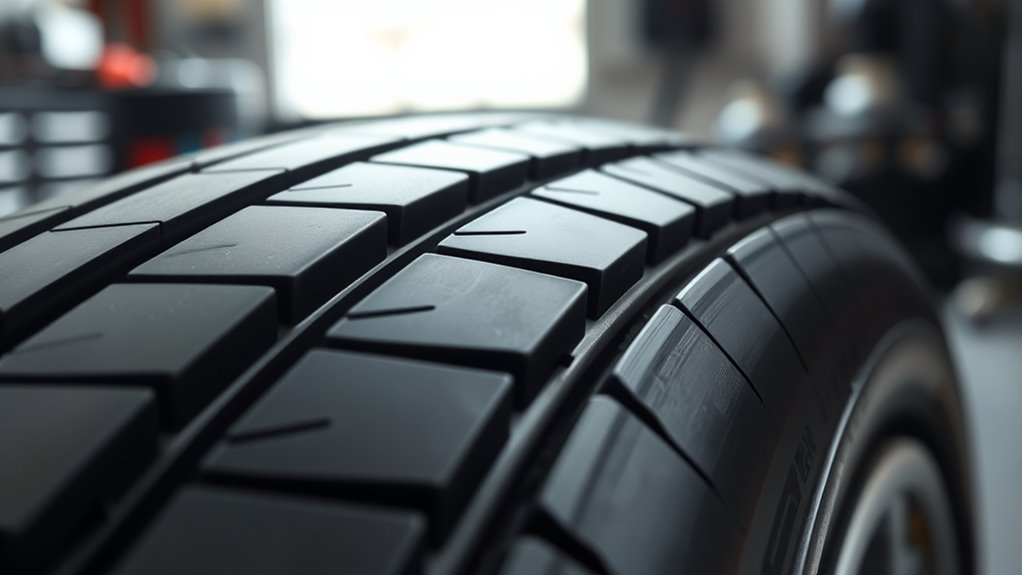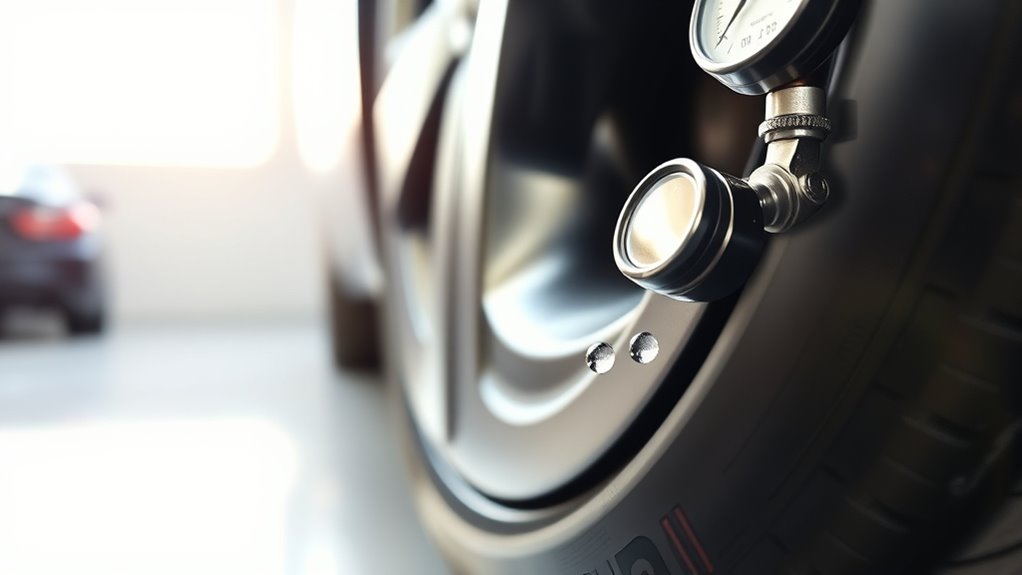Adding nitrogen to your tires won’t substantially boost performance or extend tire life beyond what regular air offers. The benefits, like better pressure retention and fuel efficiency, are minimal and often overstated. Most drivers won’t notice any difference without ongoing maintenance. Proper tire care, such as regular pressure checks and rotations, matters much more. Curious how much these myths hold up? Keep exploring to uncover the real facts behind nitrogen in tires.
Key Takeaways
- Nitrogen’s larger molecules reduce pressure loss slightly, but regular air checks are more effective for tire performance.
- Any performance benefits from nitrogen are minimal and often overshadowed by proper tire maintenance.
- Nitrogen does not prevent tire damage or significantly extend tire life without other maintenance practices.
- The cost of nitrogen filling generally outweighs its marginal performance benefits for most drivers.
- Overall, consistent tire upkeep matters more than switching to nitrogen for boosting vehicle performance.

Have you heard that adding nitrogen to your tires can considerably improve their performance and lifespan? Many believe that filling tires with nitrogen instead of regular air can lead to better tire longevity and enhanced fuel efficiency. But does this claim hold up under scrutiny? Let’s cut through the myths and see what’s real.
When you switch to nitrogen, one of the main advantages touted is that it maintains tire pressure longer than compressed air. Because nitrogen molecules are larger than oxygen molecules, they tend to escape less quickly through the rubber. This means your tires stay at the essential pressure longer, which reduces the chances of under-inflation. Proper tire pressure is vital for tire longevity, as under-inflated tires wear out faster and are more prone to damage. Maintaining consistent pressure also ensures your vehicle operates more efficiently, translating into better fuel efficiency. Less rolling resistance due to essential pressure means you’ll burn less fuel, saving you money at the pump. So, in theory, adding nitrogen can indirectly contribute to fuel savings by keeping your tires at the right pressure longer.
However, it’s important to realize that the benefits of nitrogen are often overstated. While nitrogen does help in maintaining tire pressure, the difference compared to high-quality compressed air is minimal over short periods. Regularly checking and maintaining your tire pressure is far more effective for tire longevity and fuel efficiency than simply switching to nitrogen. If you don’t keep an eye on your tires, even nitrogen won’t prevent the gradual loss of pressure over time. Also, the cost of nitrogen filling, which can be higher than air, doesn’t always justify the marginal benefits, especially since most drivers won’t notice significant changes in performance or tire wear.
Nitrogen’s benefits are minimal; regular pressure checks are more effective for tire health and efficiency.
Another myth is that nitrogen can prevent all types of tire damage or significantly extend tire life on its own. That’s not true. Proper tire maintenance—like regular rotations, alignments, and inspections—is essential regardless of what you fill your tires with. Nitrogen isn’t a miracle cure; it’s just another tool that, when combined with good driving habits, can slightly improve overall tire conditions.
Additionally, advancements in tire technology have made traditional air more reliable and easier to maintain. In the end, the real key to maximizing tire longevity and fuel efficiency lies in consistent maintenance. While adding nitrogen can keep your tires at the correct pressure a bit longer, it’s no substitute for regular checks and proper care. If you’re willing to pay the extra cost and want to potentially eke out slight improvements, nitrogen might be worth considering. But for most drivers, simple air topped off regularly will do just fine, especially if you stay vigilant about tire health.
Frequently Asked Questions
Does Nitrogen Prevent Tire Blowouts Better Than Regular Air?
Adding nitrogen doesn’t necessarily prevent tire blowouts better than regular air, but it does improve tire pressure stability over time. This consistency can reduce the risk of blowouts caused by pressure fluctuations. Plus, nitrogen offers environmental benefits by reducing greenhouse gases and extending tire life. While it’s not a miracle solution, maintaining proper pressure with nitrogen can help keep your tires safer and more efficient.
How Often Should I Refill Nitrogen in My Tires?
Tire pressure maintenance matters most for maximum mileage and safety. You should refill nitrogen every 2 to 4 weeks to keep pressure consistent. While nitrogen’s cost comparison to regular air might seem steep initially, it often pays off with prolonged tire life and better pressure retention. Regular checks help prevent premature wear and unexpected blowouts, making your driving safer and smoother. Keep up with your nitrogen refills for ideal performance and peace of mind.
Can Nitrogen Prolong Tire Lifespan Significantly?
Adding nitrogen to your tires can help prolong their lifespan, mainly because it maintains more consistent tire pressure over time. Nitrogen purity reduces the chance of moisture and contaminants that cause tire degradation. With stable tire pressure, your tires wear evenly, reducing the risk of premature damage. So, while it doesn’t drastically extend tire life, using nitrogen helps keep your tires in better condition longer, saving you money over time.
Is Nitrogen More Effective in Extreme Weather Conditions?
In extreme weather conditions, nitrogen can enhance winter performance by maintaining better thermal stability. You’ll notice less pressure fluctuation during cold temperatures, helping your tires stay properly inflated. This means improved grip and safety on icy or snowy roads. While nitrogen isn’t a magic fix, it offers more consistent tire pressure in harsh weather, so you can drive confidently even when temperatures drop dramatically.
Are There Any Safety Risks Associated With Nitrogen-Filled Tires?
Did you know that nitrogen-filled tires are less likely to deflate unexpectedly? Safety risks are minimal because nitrogen purity means fewer moisture and oxygen molecules, reducing corrosion and pressure fluctuations. However, if tire pressure isn’t checked regularly, any type of tire can become unsafe. Using nitrogen doesn’t eliminate the need for proper maintenance; it simply helps maintain consistent tire pressure and reduces the risk of sudden blowouts.
Conclusion
So, does adding nitrogen really boost your tire performance? Think of it like planting a seed—you might see faster growth with extra care, but sometimes, basic watering does the trick just fine. In our tests, nitrogen’s benefits were subtle, much like a gentle breeze that’s nice but doesn’t change the weather. Unless you’re a racing pro or rarely check your tires, sticking with regular air keeps your ride smooth without the fuss.










